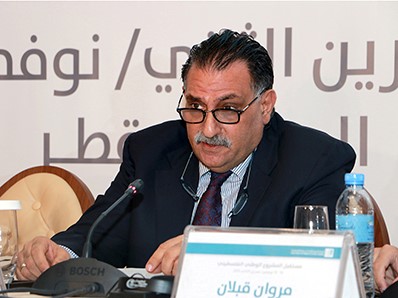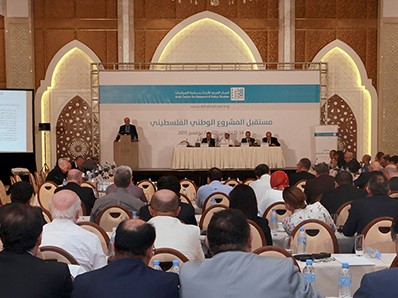Azmi Bishara, General Director of the Arab Center for Research and Policy Studies, opened a two-day academic symposium on the past and future prospects of the Palestinian national movement with a wide-ranging exposition on the growth and development of the Palestinian national movement since 1948. Speaking in the midst of a groundswell of popular anger and resistance to the occupation, Bishara defined the Palestinian national movement within its historical context as a struggle which had to distinguish itself from a broader conflict between Israel and the Arab states. Bishara explained how the rise of armed resistance as part of a PLO strategy to liberate Palestinian territory also led to a “culture of resistance” among the Palestinian people. “Without a doubt”, said Bishara, much of the Palestinian leadership was sincere in its commitment to “the path of a popular guerilla struggle”. Nonetheless, the everyday realities of forging a national liberation movement in the Third World and against a much more well equipped enemy had repeatedly forced the Palestinians to accept increasingly more conciliatory approaches.

According to Bishara’s historiography, the Palestinian National Charter, adopted in 1964, and setting out an agenda for the overall liberation not only of Palestinian territory but also the political emancipation of the people, was succeeded by a more pragmatic but also more limited “Political Program” (also known as the “Ten Point Plan”). From that point onwards, as Bishara’s address illustrated, the main aims of the Palestinian national movement were limited to the foundation of a nation state of institutions and international agreements. As he explained later, the problem was that the eventual Palestinian National Authority “accepted all of the obligations of statehoods”, “despite not being a state”.
This paradox was a focus of the further deliberations during the first panel of the symposium. As Ahmad Jamil Al Azm, a Professor of Sociology at Palestine’s Birzeit University, made clear during his intervention, the “quasi-state” that is the Palestinian National Authority was one of the foci of today’s popular struggle on the West Bank. In addition to this, said Al Azm, a professional caste who operates NGOs across the West Bank served to further entrench the complex of Occupation-and-Authority, evident in the everyday lives of Palestinians. According to Al Azm, the problem was made worse by the way in which this NGO caste, reliant on foreign funding of their institutions, was completely divorced from the reality of Palestinians on the ground. More optimistically, this was one of the aspects of what Al Azm described as the “post-modern reality of the Palestinian people”; another expression of this reality was the way in which Palestine’s political forces lacked any sense of political uniformity. Yet this was not a hurdle to development, said Al Azm: “as experiences in Egypt and Tunisia have shown us, ideological uniformity is not a prerequisite to revolutionary change”. This diversity of opinion was evident also in the opinions of speakers on the first panel.
 |
| Participants at the meeting listen to speakers from the first panel. |
Anis Al Qasim, a Jordanian legal expert, was resolute in placing the blame for the current stagnation in Palestinian affairs on the original approach of bilateral negotiations with the Israelis and offered arguments in favor of the One State Solution. Al Qasim’s lecture rehearsed a trope long familiar to Palestinians and observers of Palestinian affairs: that the PLO leadership undermined a legitimate negotiating team in Madrid, composed jointly between Jordan and the Palestinian leadership, to cut a deal with the Israelis, “after only 30 hours of talks”, in the Norwegian capital. While the team sent to Madrid was concerned with preventing the expansion of Israeli settlements, the negotiators in Oslo had pulled the rug from beneath their feet, to secure a deal that emphasized international recognition of the PLO and its member institutions as well as the establishment of “National Authority” for autonomous rule on parts of the West Bank and the Gaza Strip.
Today, political discourse among Palestinians continues to be consumed by these various arguments: whether the aim should be to fully implement and improve on the existing framework for negotiators, or whether Palestinian civil society should strive, instead, to achieve equal rights for Palestinians as citizens of a single state in the former British Mandate of Palestine. Mtaness Shehadeh, a researcher and member of the Palestinian community which remained “behind the Green Line” in 1948—whose descendants are today nominal Israeli citizens—demonstrated the difficulty in trying to account for the national needs of the entire Palestinian people, in Palestine and abroad. Relying on opinion polls carried out by Mada al Karmel amongst Palestinian citizens of Israel in 2004 and 2005, Shehadeh noted that a vast majority of these Palestinians—upwards of 85%--felt that they would only receive equal rights if the nature of the Israeli state was fundamentally altered from a “Jewish and Democratic” state into a state for all of its citizens. Nonetheless, support for a “unitary and secular” state across all of Palestine, including the occupied Palestinian Territories, ran to only 13% amongst the same group of marginalized Palestinians. In contrast, only a small minority of West Bank Palestinians (11%) believed that the Palestinian citizens of Israel had a major role to play in shaping the future of the Palestinian National Movement.
While speakers during the second day of the symposium will move on to discuss questions of international law, the status of Jerusalem and its relation to the broader struggle as well as the role of the Palestinian Diaspora, Shehadeh’s lecture gave participants time for a sobering pause: the question of who is entitled to speak as a Palestinian seems yet to be resolved.